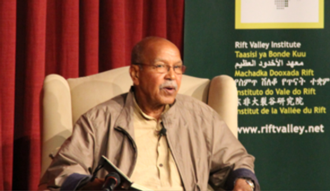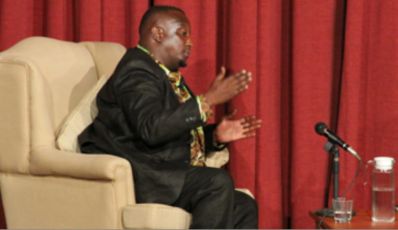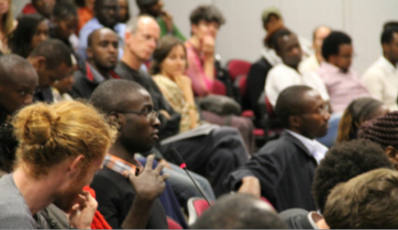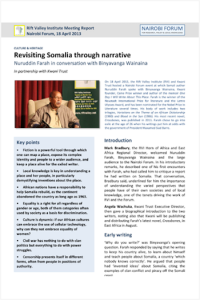Key points
-
Fiction is a powerful tool through which one can map a place, expose its complex identity and people to a wider audience, and keep a place alive for the exiled writer.
-
Local knowledge is key in understanding a place and her people, in particularly demystifying inventions about the place.
-
African nations have a responsibility to help Somalia rebuild, as the continent abandoned the country as long ago as 1963.
-
Equality is a right for all regardless of gender or age, both of them categories often used by society as a basis for discrimination.
-
Culture is dynamic: if our African cultures can embrace the use of cellular technology, why can they not embrace equality of women?
-
Civil war has nothing to do with clan politics but everything to do with power struggles.
-
Censorship presents itself in different forms, often from people in positions of authority.
Introduction
Mark Bradbury, the RVI Horn of Africa and East Africa Regional Director, welcomed Nuruddin Farah, Binyavanga Wainaina and the large audience to the Nairobi Forum. In his introductory remarks, he described one of his first encounters with Farah, who had called him to critique a report he had written on Somalia. That conversation, Bradbury said, underlined for him the importance of understanding the varied perspectives that people have of their own societies and of local knowledge, one of the tenets driving the work of RVI and the Forum.
Angela Wachuka, Kwani Trust Executive Director, then gave a biographical introduction to the two writers, noting also that Kwani will be publishing and distributing Farah’s latest novel, Crossbones, in East Africa in August.
Early writing
‘Why do you write?’ was Binyavanga’s opening question. Farah responded by saying that he writes to keep his country alive, to learn about himself and teach people about Somalia, a country ‘which nobody knows correctly’. He argued that people had ‘invented ideas’ about Somalia, citing the examples of clan conflict and piracy off the Somali coast.
 Narrating in an engaging manner his fascination with writing from an early age, Farah how, having been sent at the age of four by his mother to Koranic school, he was fascinated with the idea of ‘giving shape to sounds’. He enjoyed copying the Arabic script—even though he could not yet understand it.
Narrating in an engaging manner his fascination with writing from an early age, Farah how, having been sent at the age of four by his mother to Koranic school, he was fascinated with the idea of ‘giving shape to sounds’. He enjoyed copying the Arabic script—even though he could not yet understand it.
By the age of nine, Farah could speak Somali, Italian, Arabic and English. His linguistic skills were matched by those of the entre-preneur: he ran a lucrative business writing letters for illiterate adults. The business did well until the point when a man asked him to write to his wife, who had been away from home.
The husband demanded in the letter that she return in 30 days or face his wrath: he would seek her out, break every bone in her body and drag her back home. The nine-year-old Nuruddin, shocked by his perceived injustice of this, decided to ‘edit’ the contents of the letter the man dictated to him. So he wrote instead: ‘If you do not return in 30 days, consider yourself divorced.’ The wife, after the stipulated period, took the letter to a Kadhi (judge), who declared her divorced. When the husband went in search of his wife, he found that she was married to someone else. He appealed to the Kadhi, who upheld the divorce based on the letter. The angry man then complained to Farah’s father, who promptly banned him from writing.
Nuruddin’s concern for the rights of woman, has been a constant in his novels. Even at that age, he was clear that ‘no-one had a right to beat up someone, break their bones and drag her across the borders’.
Censorship
 This was Farah’s first but by no means last experience of censorship. He was later banned from delivering poetry for his mother when he changed the words of the Burambo—a genre of poetry traditionally performed by women—that he had been asked to recite at a wedding. ‘When I didn’t remember a word,’ he explained, ‘I made it up.’ At the age of 16, he rewrote a school text book by the American Nobel laureate Ernest Hemingway. ‘I thought Hemingway had got it wrong,’ he said, describing how it resulted in his being kicked out of school by his American teacher.
This was Farah’s first but by no means last experience of censorship. He was later banned from delivering poetry for his mother when he changed the words of the Burambo—a genre of poetry traditionally performed by women—that he had been asked to recite at a wedding. ‘When I didn’t remember a word,’ he explained, ‘I made it up.’ At the age of 16, he rewrote a school text book by the American Nobel laureate Ernest Hemingway. ‘I thought Hemingway had got it wrong,’ he said, describing how it resulted in his being kicked out of school by his American teacher.
Later, when he worked for the government of Somalia as a clerk, his boss told him that, as a government employee, he could not write on government time. He also told the audience that after the publication of his novel From a Crooked Rib, he was censured for ‘exposing’ Somali culture. ‘Somalis told me that I was washing our dirty linen in public,’ he said.
Equality vs. discrimination
Farah emphasized the importance of equality for all, decrying all sorts of discrimination. ‘We in Africa, in Somalia, would do far better if we gave each individual the respect that is due to them,’ he said. The author, whose writing has been described as feminist, commented on the resistance to change in Africa and the contradictions of contemporary life. He cited the example of someone justifying the existence of female circumcision on the basis of a culture that cannot be changed, yet the same person had embraced cultural change by taking up the iPhone.
‘We must respect the individual for who they are and not where they are from,’ Farah added, commenting on xenophobia in Nairobi and Cape Town, where he now lives. He also urged a proper examination of historical events, such as massacres of Somali people in Kenya, that have neither been acknowledged nor accounted for. The author spoke of learning about Kenya in the Somali school curriculum—yet, he said, many Kenyans know little about Somalia.
Politics: Truth and invention
Tracing the roots of Somalia’s troubles, Farah argued that the country had been ‘isolated’ for challenging the colonial mapping of Africa during the Organization of African Unity meeting of 1963. This, he said, was when Somalia turned its back on the rest of Africa and joined the Arab League. ‘If you send your dog out and it bites someone, you take responsibility,’ said Farah, arguing that the continent had a historical responsibility to come to Somalia’s aid.
The author described stories about piracy in Somalia as ‘inventions’. ‘Everybody believes what others say about Somalia,’ he said, cautioning against giving credence to ‘generalizations’ that have created misunderstandings about the country.
‘The only truth is in fiction,’ he asserted. ‘The Somalia I bring forth is audibly less chaotic,’ he said, warning that it was important that the people of Somalia remain true to their country. He intimated that those who engaged in divisive ‘clan politics’ or supported clan wars through remittances and Somali publications on the web were simply ‘destructive’. ‘When a people have started living their own lies, they are in trouble forever,’ he concluded.
Questions from the audience
Members of the public who attended the session then had the opportunity to join the conversation by way of a question and answer session, moderated by Angela Wachuka.
 Austin Bukenya, Ugandan poet and author of the novel The People’s Bachelor, commented that Farah’s ability to write in his fourth language in an accessible manner presented a challenge to all writers. ‘The duty of a writer is to be tough, survive and write,’ said Bukenya, citing Hemingway’s advice to aspiring writers.
Austin Bukenya, Ugandan poet and author of the novel The People’s Bachelor, commented that Farah’s ability to write in his fourth language in an accessible manner presented a challenge to all writers. ‘The duty of a writer is to be tough, survive and write,’ said Bukenya, citing Hemingway’s advice to aspiring writers.
Cosmopolitanism in Mogadishu also came up in the audience interaction. Farah lamented the death of cosmopolitanism in the city, which in its heyday was a melting point of cultures. ‘What died is the idea of cosmopolitanism,’ he said, referring to his essay on the subject, ‘Of Tamarinds and Cosmopolitanism’. ‘What no one can reconstruct is the idea that was in our hearts, because there is mistrust among the people,’ he said, emphasizing that restoring Mogadishu to its former physical glory could be done but the social engineering necessary to recapture its cosmopolitan nature could remain elusive.
‘People have to be reconstructed individually,’ he explained, drawing parallels with the situations in neighbouring Kenya and Sudan, where the social fabric has also become fragmented. For Farah, this can only be done by Somalis themselves: ‘not even 20 million AMISOM troops could achieve this’, he added.
Farah stressed the importance in his work of ‘mapping’ Mogadishu by paying detailed attention to the city’s geography and describing it, street by street, alley by alley. ‘It was as though I knew I would never return to Mogadishu,’ he said, responding to a question on whether Mogadishu could be rebuilt. He cited old maps as a good guide to rebuilding the capital.
Finally, sources of inspiration for his writing and his favourite authors were among the issues that came up in the discussion session. ‘I do not wait for inspiration,’ he said. He explained how he keeps a rigorous 9-to-5 work schedule—and writes everything in longhand. ‘I am a professional writer,’ said Farah simply.




